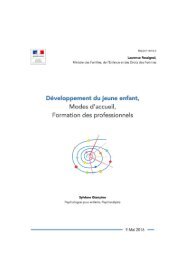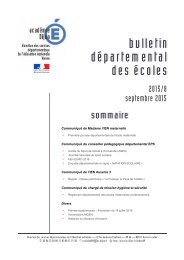agrl_innovations_in_ssa.pdf?utm_content=buffercb41d&utm_medium=social&utm_source=twitter
agrl_innovations_in_ssa.pdf?utm_content=buffercb41d&utm_medium=social&utm_source=twitter
agrl_innovations_in_ssa.pdf?utm_content=buffercb41d&utm_medium=social&utm_source=twitter
You also want an ePaper? Increase the reach of your titles
YUMPU automatically turns print PDFs into web optimized ePapers that Google loves.
contribution of soil fertility improvement through nitrogen fixation. Despite these benefits<br />
gra<strong>in</strong> legume production is characterised by low yields with farmers experienc<strong>in</strong>g serious<br />
problems <strong>in</strong> access<strong>in</strong>g legume seed.<br />
The challenge. The ma<strong>in</strong> seed companies <strong>in</strong> the country have focused primarily on maize<br />
seed production to the detriment of other crops. The Government’s programme of provid<strong>in</strong>g<br />
subsidised seed and fertiliser for smallholder famers <strong>in</strong>itially focused on maize but now <strong>in</strong>cludes<br />
legumes as it was recognised that their <strong>in</strong>clusion was desirable both from human nutritional<br />
and soil fertility perspectives. However a serious shortage of seed has been a major constra<strong>in</strong>t.<br />
Innovation trigger. RIU-Malawi funded by DFID was <strong>in</strong>strumental <strong>in</strong> promot<strong>in</strong>g an <strong>in</strong>novation<br />
systems approach that facilitated the br<strong>in</strong>g<strong>in</strong>g together of legume seed stakeholders <strong>in</strong> an IP to<br />
identify bottlenecks and opportunities to <strong>in</strong>crease seed availability (RIU, 2011). The IP <strong>in</strong>cluded<br />
breeders and seed services responsible for seed <strong>in</strong>spections and certification, MoA&FS crop<br />
production and extension staff, seed companies and farmers.<br />
A National Innovations Coalition (NIC) comprised of Champions from a range of IPs acts as a<br />
national platform for leverag<strong>in</strong>g policy advocacy with Government. In the case of the Legume<br />
IP the representative for the MoA&FS is the National Coord<strong>in</strong>ator of gra<strong>in</strong> legumes research<br />
<strong>in</strong> Malawi. He was pivotal <strong>in</strong> ensur<strong>in</strong>g Government policy support for the private sector<br />
<strong>in</strong>volvement <strong>in</strong> produc<strong>in</strong>g breeder’s seed and <strong>in</strong> help<strong>in</strong>g to broker l<strong>in</strong>kages for the participation<br />
of farmers <strong>in</strong> multiply<strong>in</strong>g breeder and basic seed for certified seed production. At the same<br />
time a key <strong>in</strong>dividual on the IP is a member of a Government TF to identify a strategy for the<br />
legume sector under the Government’s Input Subsidy Programme.<br />
Stakeholder <strong>in</strong>teractions and <strong>in</strong>terventions. Key stakeholders <strong>in</strong>cluded (CIAT, DARS, the Department<br />
of Agricultural Extension Services (DAES), Seed Trade Association of Malawi (STAM), represent<strong>in</strong>g<br />
seed companies, Association for Smallholder Seed Multiplication (ASSMAG) and Gra<strong>in</strong> Legumes<br />
Association (GALA) represent<strong>in</strong>g famer organisations, <strong>in</strong>put suppliers and seed companies. Key<br />
IP partners <strong>in</strong>cluded a Champion, a bean breeder with CIAT, DARS-Chitedze legume coord<strong>in</strong>ator,<br />
DARS Seed Services, Demeter Farms, from the private sector and the Seed Trade STAM.<br />
The partnership operated through jo<strong>in</strong>t meet<strong>in</strong>gs facilitated to review legume seed systems,<br />
identify opportunities for overcom<strong>in</strong>g constra<strong>in</strong>ts, plan, <strong>in</strong>itiate and monitor actions that would<br />
improve seed availability and use. The IP enhanced communication and <strong>in</strong>teraction between<br />
stakeholders <strong>in</strong>creas<strong>in</strong>g the <strong>in</strong>terest of private sector companies. The IP meets regularly<br />
allow<strong>in</strong>g partners to review progress and share experiences, document progress, successes,<br />
challenges and lessons learned. Where nece<strong>ssa</strong>ry the IP established special TFs to resolve<br />
technical bottlenecks.<br />
An <strong>in</strong>itial analysis <strong>in</strong>volved look<strong>in</strong>g at the whole seed value cha<strong>in</strong> from new variety approval<br />
and release, through production of breeders’, foundation and certified seed for sale to farmers.<br />
The critical constra<strong>in</strong>t was identified as be<strong>in</strong>g the lack of sufficient breeders’ seed. Although<br />
breeders were attempt<strong>in</strong>g to meet the demand, it was tak<strong>in</strong>g time and resources from ongo<strong>in</strong>g<br />
crop breed<strong>in</strong>g research. Unfortunately legume seed is required <strong>in</strong> larger quantities than maize<br />
as the crop’s seed requirements are much greater. In addition production of some legume seed,<br />
particularly beans, is best undertaken <strong>in</strong> the dry season under irrigation. Irrigation facilities at<br />
Government research <strong>in</strong>stitutes are extremely limited and valuable water is therefore only<br />
used <strong>in</strong> breed<strong>in</strong>g research programmes. The proposed solution was for small quantities of<br />
54 Agricultural Innovation <strong>in</strong> Sub-Saharan Africa






